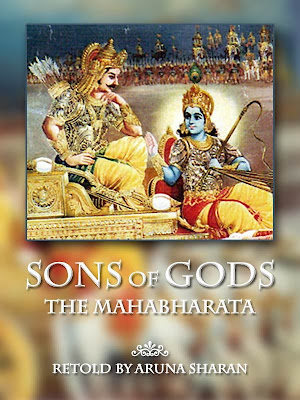A Song for an Unsung Hero

Recently a friend asked me why I had done this; why rewrite a work that already has so many versions out there? What, if anything, makes this English Mahabharata different? Playing devil's advocate, she asked: surely it's idle vanity to put yet a new edition into the mix -- with a new author and even a new title?
(image: Karna's chariot wheel sinks
into the earth.)
I'll answer the first question first, and give you a task: look up any current edition of the Mahabharata and seek a synopsis of the story. Inevitably you will find some version of the following:
"The Mahabharata is the story of a family feud in ancient India, culminating in a terrible war. The five Pandava brothers, under the protection of Krishna, an Incarnation of God, have been cheated of the kingdom that is rightly theirs, and must fight not only to win it back but to reestablish righteousness in the world."
And that is, indeed, the core story in a nutshell.
But it's not the whole story.
There's another story waiting in the wings. A story that, in every other version, is told as merely a side plot, sometimes just mentioned, as if of little account. And is never, ever alluded to in the synopsis.
From the day I finished reading my first Mahabharata this "other story" has been the one I've longed to tell: the story of the underdog who is actually the key to the whole drama, the forgotten hero who makes the greatest sacrifice of all: the story of Karna.
The fact is: without Karna there would be no Mahabharata. Though he is never mentioned in descriptions of the main Mahabharata plot, without him there would be no story at all. On him rests the responsibility for Duryodhana's push for power; he goads him on for all the wrong reasons. Karna's motivation is revenge and envy: he uses Duryodhana to fulfill unhealthy needs, just as Duryodhana uses him to fulfill his own insatiable ambitions. And yet in the end Karna makes a decision through which he redeems himself and all his wrongdoing: the decision that finally makes war inevitable. Karna , with just one word, has the power to prevent the war. But he doesn't. And somehow, we applaud him for that.
The Mahabharata is not just a simple story of good versus evil. That would be boring. In fact, the "good" Pandavas shock us with their breaking of almost all of the rules during the great war. Whereas Karna, on the side of the villains, exits the story as the greatest hero of them all.
It is this moral ambiguity that makes the Mahabharata such a great book. It's not all black-and-white. All through the story there are shades of grey, and Karna, more than any other of the great heroes, deserves a new retelling of the story, one that emphasises his role in the drama. He is the reason for this new version.
To the second question posed by my well-meaning friend, the quetsion of vanity: it's one it's one I've asked myself again and again. For the Mahabharata should never be written out of vanity. At its core is the Bhagavad Gita, in which Krishna instructs Arjuna on the path of right action: that is, action without regard for the fruits of action. Action with detachment. I've tried to write this in that spirit. It began as merely a hobby, a literary exercise done for my own satisfaction; the actual trial, of course, came at that moment when I decided to go public with it; for going public brings in its wake all the perils of ego-gratification.
Writing under a pen-name is an aid to detachment. By giving the book a title of its own I give it its own little niche. This is not "The Mahabharata", which to me is, and must be, the entire work composed under that name. This is an extract, the core story, retold with an emphasis on Karna. That is all.



Comments